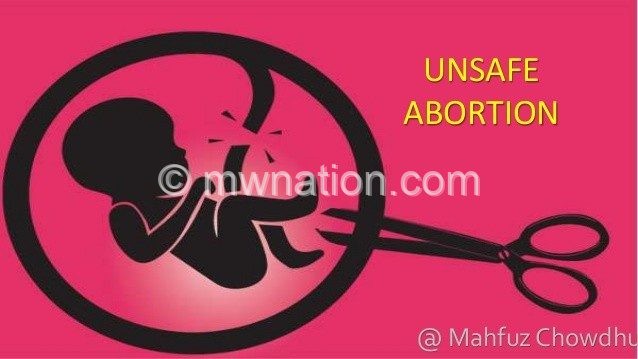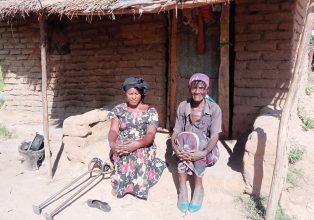Calls for safe abortion persist
Lying on a hospital bed in Kamuzu Central Hospital’s Gynaecological ward, Edna, 16, is battling for her life after clandestinely terminating a pregnancy.
When she fell pregnant, the Form Four student from Area 36 Township in Lilongwe was terrified of how her parents would react to the news.

Afraid of being chastised by her parents and society, he secretly swallowed a pill to remove the pregnancy.
“I started experiencing excruciating pain and bleeding a few minutes after taking the pill my friend gave me,” she says from her sickbed.
Edna’s mother rushed her to the Central Region’s largest hospital where she spent five days receiving post-abortion care.
Edna’s mother couldn’t believe her teen daughter was sexually active and secretly procured an abortion.
“I did it to stay in school and avoid shame and reprisals,” Edna states.
Ipas Malawi health system adviser Christopher Kandionamaso says complications of backstreet abortion in Malawi claim about 18 in every 100 lives lost due to pregnancy-related conditions.
However, the country’s penal laws only allow health workers to terminate a pregnancy when the woman’s life is in danger.
“It is obvious that strict laws do not prevent abortion,” he says. “This is why the government must increase grounds for health workers to conduct legal abortion.”
According to the Coalition for the Prevention of Unsafe Abortion (Copua), 25 929 women and girls procured unsafe abortions in 2020. The count rose to 35 933 in 2021 and 52 598 in 2022, the lobby group reports.
Blantyre District had the highest burden of unsafe abortion, with 665 women and girls seeking post-abortion in 2020, about 1 150 in 2021 and 3 400 in 2022.
There was a similar trend in Lilongwe, where tallies of recipients of post-abortion care rose from 1 098 cases in 2020 to 7 851 two years ago.
In rural settings, health workers in Rumphi District assisted 327 patients with abortion complications in 2020 and 569 in 2022.
In 2009, a Ministry of Health study conducted in hospital wards showed that the government spends about $435 000 treating abortion complications though health workers are banned from terminating pregnancies on demand.
Copua vice-chairperson Dr Amos Nyaka says relaxing the country’s colonial law would increase access to safe abortion and save this expenditure for other essential healthcare needs.
A 2015 nationwide study by researchers from the University Malawi’s College of Medicine (now Kamuzu College of Health Sciences) and the US-based Guttmacher Institute revealed that 491 000 pregnancies in Malawi were unintended and 134 000 ended in abortion.
In Malawi, abortion complications constitute the third largest killer of pregnant women and girls, causing up to 18 percent of maternal deaths.
The country’s Penal Code inherited from British colonial masters only permits surgical abortion to save the life of a pregnant woman.
The penal law prescribes jail terms of seven to 14 years for procuring, providing or aiding abortion.
Additionally, a medical practitioner found guilty of providing or attempting an abortion faces suspension from duty or erasure from a register of certified health workers.
In 2012, the Ministry of Health’s push for safe motherhood compelled former president Joyce Banda to name a Law Commission to review the country’s abortion laws and international obligations.
In 2015, the commissioners rejected calls to legalise abortion on demand but proposed new grounds for safe termination of pregnancy.
If passed by Parliament, the proposed law reform would give every woman the liberty to abort in a clinical setting if the pregnancy results from rape, defilement or incest; if it harms the woman’s physical and mental well-being and the foetus is too malformed.
The proposed Termination of Pregnancy Bill gathered dust in the ministries of Health and Justice until 2021 when Chiradzulu West legislator Mathews Ngwale filed a motion to discuss it in the National Assembly.
However, the government filed a counter-motion not to debate the private member’s Bill which resembled the Termination of Pregnancy Bill proposed by the special Law Commission.
The Bill faced fierce opposition from some churches and culture warriors who branded it murderous and contrary to Malawian culture.
Ngwale has since withdrawn it from Parliament’s business until there is sufficient public demand from constituents for lawmakers to debate it.
“It’s time parents and all Malawians accepted the reality that their children are having sex and they can get pregnant. We need to advocate for laws that will empower them to make the right choices and save lives,” says the chairperson of the Parliamentary Committee.
Ngwale volunteered to table the Bill for debate in Parliament before it was dramatically withdrawn.
While he is upbeat that the Bill would be taken back to Parliament, he called for more awareness on the Bill, to avoid a similar incident.
“Most of the Parliamentarians don’t understand the importance of this Bill. What matters to them is the constituency, the voters. The constituency has religious people, traditional leaders and many people who think this is a taboo. It is difficult for the MPs to compromise,” he says.
Centre for Human Rights and Rehabilitation executive director Michael Kaiyatsa says proposals to liberalise termination of pregnancy will empower women, particularly in rural areas, to access safe abortion services that the well-to-do in urban locations, access at a fee in private clinics.
University student Kuunika Kamende called for renewed efforts to make Malawians aware of the deadly implications of unsafe abortion as well as the importance of contraceptives, especially among the youth, to prevent unwanted pregnancies.





